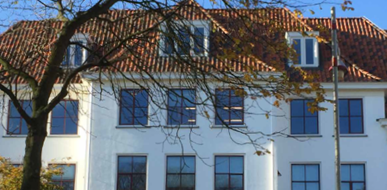Research collaboration between the Hofstad Lyceum and the T.M.C. Asser Instituut
Published 1 June 2020
Since the spring of 2018, the Asser Institute has worked with the Hofstad Lyceum, a secondary school in The Hague with an enrolment of about 1,000. Within this framework, graduation-year students are offered the opportunity to do their mandatory thesis project ('profielwerkstuk') at the Asser Institute, co-supervised by the Social Studies teacher and an Asser researcher. The year-long thesis project includes writing an extensive literature review and designing and conducting a social scientific quantitative and/or qualitative study. Students are expected to elaborate their own research topic within an existing project at the Asser Institute.
Oumaya el Battioui and Imane Bourahtouf completed the first thesis in the spring of 2020, entitled Terrorism Prevention at the Hofstad Lyceum and co-supervised by Flemming van de Graaf (Hofstad) and Dr Sofia Stolk (Asser). The project was inspired by the Asser research on preventing and responding to terrorism and radicalization and was conducted in connection with the Lifecycle Initiative Toolkit, initiated by the Global Counterterrorism Forum. The thesis was awarded 10 out of 10 points.
From the students
We, Oumaya el Battioui and Imane Bourahtouf, students at the Hofstad Lyceum in The Hague, wrote the study on terrorism prevention at secondary schools as our profile paper in our graduation year in pre-university education (2019-2020), supervised by Flemming van de Graaf and Sofia Stolk.
Our profile paper supervisor Flemming van de Graaf suggested we draft a proposal for a profile paper together with the Asser research institute. Of course we were delighted with this idea and were very eager to start the research. Our second supervisor, Sofia Stolk from the Asser Institute, joined us to identify a relevant problem we could study with a view toward future use for both the Asser Institute and us as students. We visited the Asser Institute a few times and even produced a brief information video about the Asser Institute for our Social Sciences course. The whole experience cannot be conveyed in words and has been unforgettable!
Terrorism, in connection with radicalization, is a horrible phenomenon that should be prevented wherever possible. To this end, we studied various issues relating to terrorism and radicalization. Based on this information, we drafted a survey for students at the Hofstad Lyceum (years 1 through 6) with questions about teaching methods relating to terrorism and/or radicalization. We also compiled a questionnaire for interviews with 8 instructors at the Hofstad Lyceum.
The results, which appear in the research report, aptly convey the wishes and need for education about terrorism and radicalization at the Hofstad Lyceum. We hope our research will give rise to additional, more extensive studies on ways of teaching this subject, aimed at devising an ideal teaching method to use in secondary education.
Summary of the thesis
The study on the extent to which instructors at secondary schools can help prevent terrorism was conducted in conjunction with the Asser Institute. In the study we explored the current selection of teaching material about terrorism and radicalization, as well as in what measure it benefits instructors and students. This study arises from curiosity about the origins of terrorism. In conjunction with the Asser Institute we have compiled a study based on six sub-questions.
Using the findings resulting from the sub-questions, we sought the best method(s) to examine in what measure instructors at secondary schools can contribute toward preventing terrorism. This yielded the following research methods:
- Conducting a survey among all students at the Hofstad Lyceum.
- Conducting interviews among teachers at the Hofstad Lyceum.
We received 232 answers to the surveys and interviewed 8 teachers at the Hofstad Lyceum. These findings have been transcribed in the results. We used the results to draft a conclusion, in which we compare the different suggestions, solutions and criteria. The significant results were as follows:
In the surveys, students expressed their interest in being taught about radicalization and terrorism alike: 74.1 % of the students believe that discussing the subject of terrorism in classes on world view/life orientation would be the best way.
The teachers interviewed mentioned that they benefited from learning and increasing their basic knowledge about the subject. Most consider it to be worthwhile and are therefore receptive to obtaining resources or materials conducive to this end, such as information leaflets and manuals. All teachers interviewed are interested in information gatherings as well. Some suggested having an expert come visit. Others said they would organize an afternoon seminar. Many mentioned a workshop as well, indicating that they used manuals and/or scripts here, to be certain that teachers actually know how to use it.
As for teaching material, most teachers agreed that the subject need not be addressed in each class. In a select number of subjects, teachers can find ways to connect a recent event relating to terrorism and/or radicalization to the subject that he or she teaches. This maintains relevance.
This project is financially supported by The Hague Municipality.

